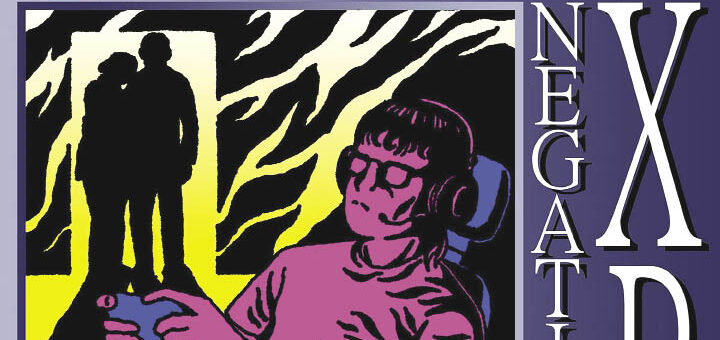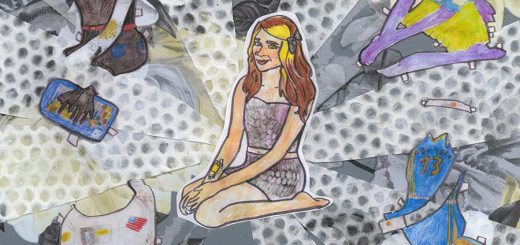The counterculture movement according to Indie punk-rocker Negative XP

Matthew Hillier, Staff Writer
When you think of “counterculture,” what comes to mind? Is it a movement, an idea or a simple concept to describe something that’s not mainstream?
You may have an answer but yours and mine will likely differ. This illustrates that the simple concept of counterculture has been muddled by culture itself. Nowadays “culture” isn’t an agreed upon concept but rather an ever-changing interpretation of norms and morals that often differ from person to person. ‘Countering’ this new form of culture is as personal as the interpretation of culture itself. One artist has taken a stab at bringing his brand of counterculture to the world in the form of personal and introspective punk-rock.
Negative XP is an artist who besides his music and his face, very few know about. I would say that this is a benefit, as listeners looking for more insight into his personality will have to pay closer attention to his music itself rather than interviews or social media.
His music is completely divorced from any concept of modern punk that you may be familiar with. His tracks range from slow melodies accompanied by understated lyrics to tracks that are full of in-your-face distorted guitars accompanied by angry drums and everything in between. His musical style is reminiscent of the early ‘80s and ‘70s punk-rock scene but even saying that is a stretch. Negative XP’s music almost occupies a genre entirely on its own. For better or worse, this makes trying to compare his music to an era or even a specific artist a hard task.
Some tracks are full of purposeful lyrics, with instrumentals that could compete with other highly produced tracks from other punk-rock artists, other songs contain lyrics filled with emotions of sadness and anger. It seemed like instrumentals were an afterthought. While this may be a negative quality for any other artist to have, in the case of Negative XP regardless of the quality he presents, his tracks leave you with the sense that every note and lyric was written specifically for him.
His lyrics, combined with the anger in his music, often paint sad pictures of adolescents lost in waves of apathy and loneliness. Some of these songs are outside observations and criticisms of an angry and lonely high-schooler, while other songs make use of his personal experiences of feeling vexed with the world. A good example of the latter are the lyrics in the song “The Angels in Heaven Sigh My Name” which are, “I’m walking around with my head hung down/ I’m looking all around/ For something or somebody to see/ that something’s wrong with me.”
Regardless if he is an observer or a participant of a life experience, there is always a direct connection between Negative XP’s music and the feeling of someone who has been “othered” by everything from classmates to society as a whole.
This is amplified when Negative XP writes criticisms on culture as a whole. He is fond of doing this by harkening imagery from the CIA experiment MK-Ultra.
This imagery started being used in his first collaborative album MK-Ultra Support Group and the name stuck. All subsequent collaborative albums under Negative XP’s belt use the same name. In addition, he has three songs on these albums that are directly named after the experiment, these are titled “MKULTRA VICTIM,” “MKULTRA SUPPORT GROUP” and “mkultrasupportgroup.com.” This imagery in both his solo albums and his collaborative ones where the phrase “Mk-ultra victim” is used heavily as an insult directed towards everything from burnt out e-girls to internet music critic Anthony Fantano.
His lyrics view the failed mind control experiment as having succeeded. His critical imagery on modern consumer culture emphasises how it traps a person in mediocrity and stability, until the only thing that makes you happy anymore are self-destructive creature comforts that are happily provided by society. In his mind the CIA isn’t forcing you to take LSD anymore, it has tricked you into taking it with a smile on your face.
This personal and unapologetic approach to music creation and cultural criticism landed him in hot water straight out of the gate. His breakout track “Scott Pilgrim vs The World Ruined an Entire Generation of Women,” garnered millions of listens on streaming platforms and brought him recognition and controversy in equal measure. This controversy stems from the song’s lyrics which aim to demean and poke fun at the “alt.”
His lyrics veer harshly from light-hearted jabs at a constructed charcuterie to jarring and intense insults that aim to hurt anyone who shares something in common with it. Many obviously took issue with the misogynistic lyrics. Regardless of the artist’s intention, people viewed the lyrics as a shameful step back for the progress in gender equality made in punk music. Others still tried to emphasise that his lyrics might be satirical in nature and thus are comparable in intention and tone to the misogyny of both older punk and other genres like hip-hop that purposefully aim to offend and mischaracterize, and therefore shouldn’t be taken as seriously.
However, Negative XP has made no attempt to steer the narrative either way. He has not commented on his intentions with the lyrics since its release in 2019. Regardless of his intention the song is oddly personal. Despite the obvious problems with the lyrics, they help the listener grasp Negative XP’s approach to cultural observation and his own brand of counterculture with its uncomfortable lyrics.
Negative XP envisions culture as an ever-changing yet stagnant oppressive force that is obsessed with assimilating any dissenters into the fold of mediocrity. According to him, you can be a force for counterculture. Eventually, all you will end up doing is incorporating your brand of “rebellion” into a mediocre, all-encompassing and sterile status quo.
His own “rebellion” is personal, abrasive and uncaring of who it reaches or what comes from it. The only intention that is consistent in his music and lyrics is the intention to show the perspective of someone ignored and othered by the unfathomable and ever-changing monster that is culture. A culture that, from his perspective, treats the ones outside of it with disdain and suspicion; simply for the crime of not being willing or able to become a part of it.



